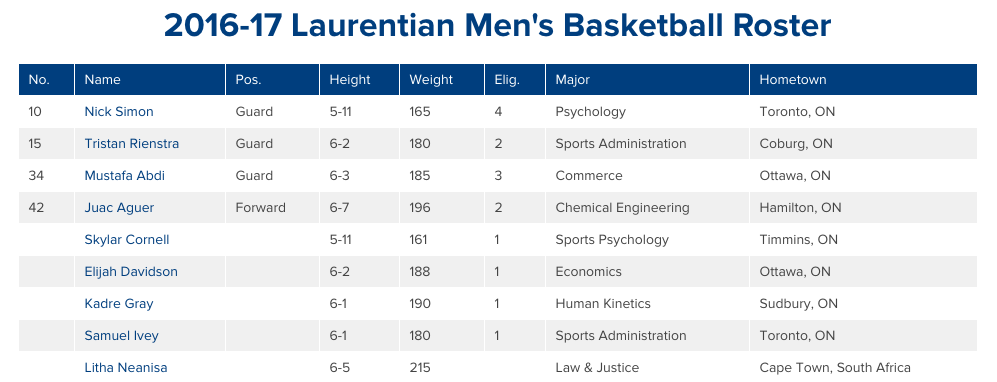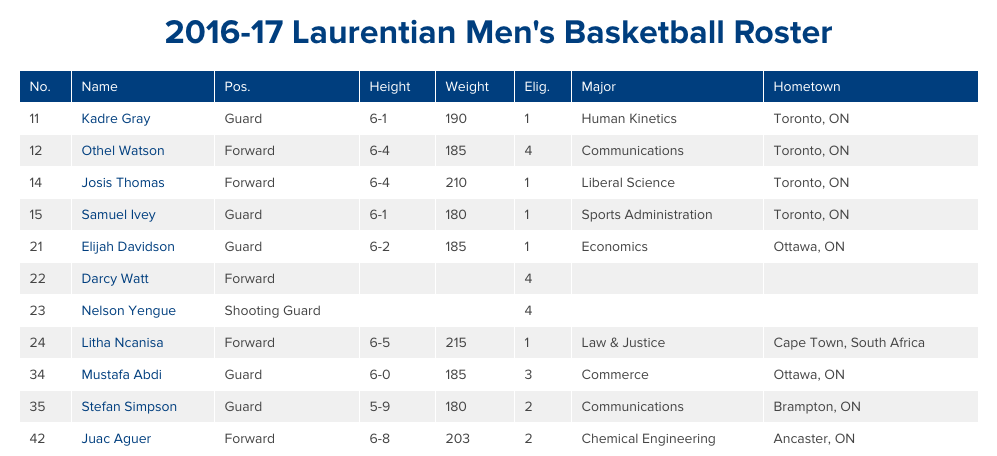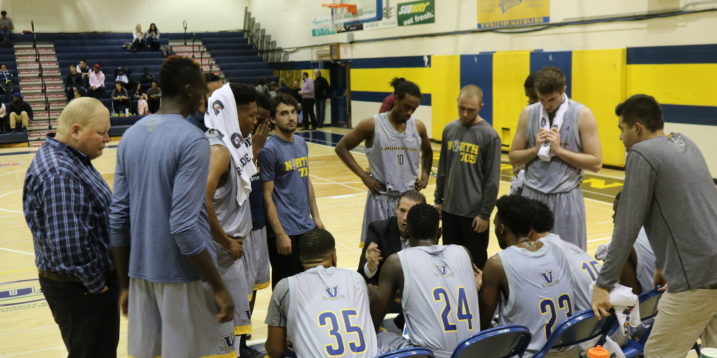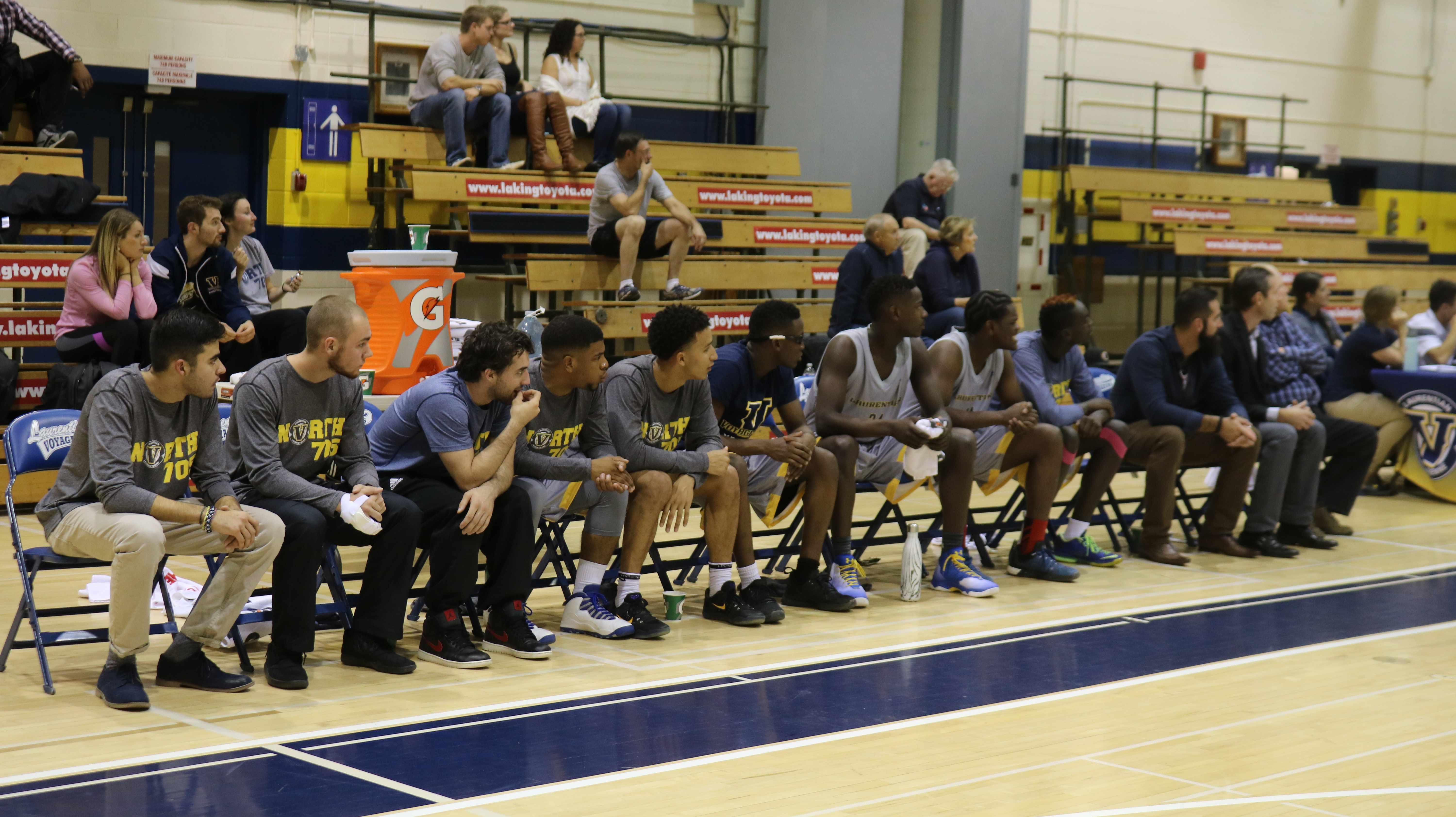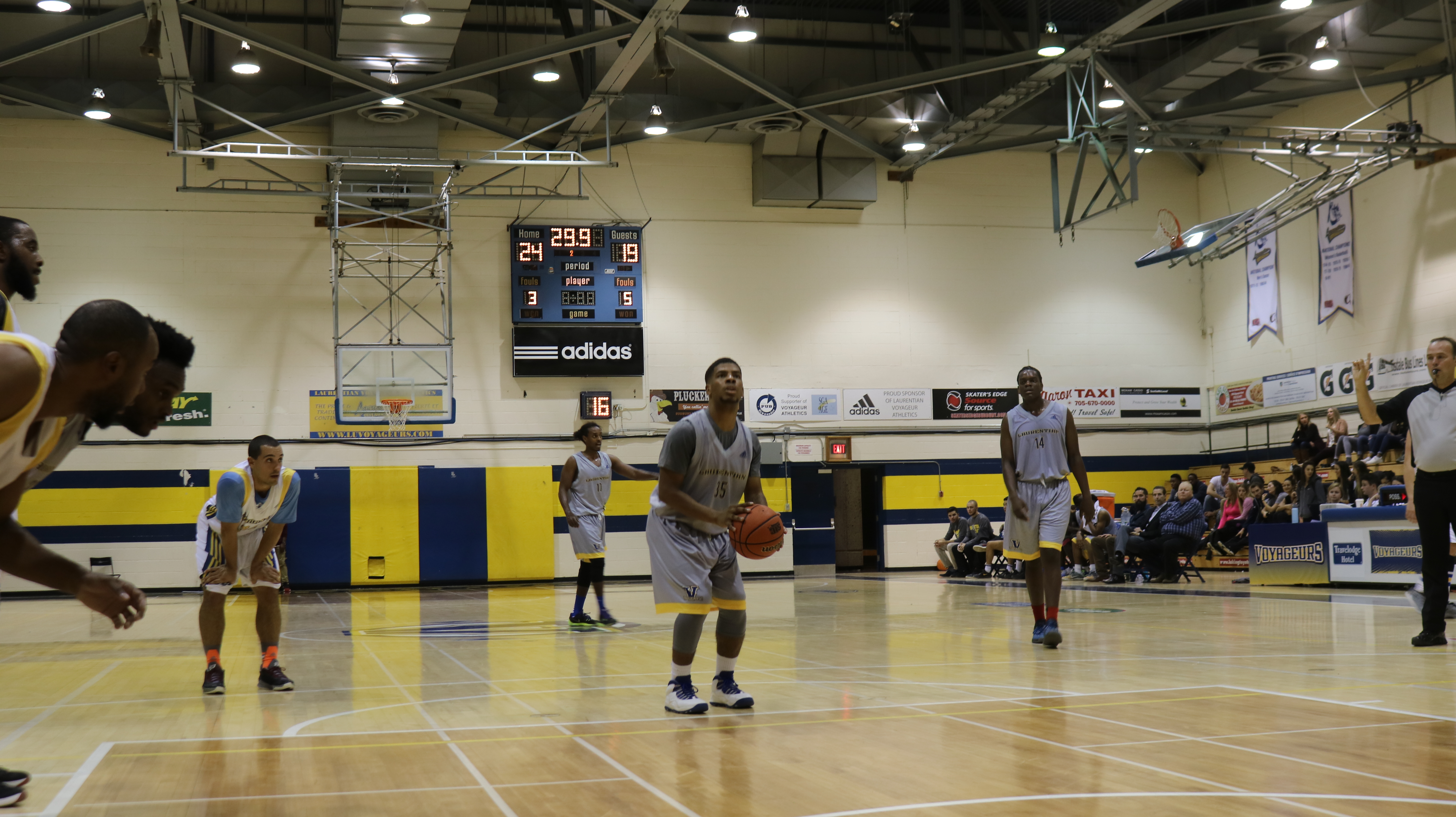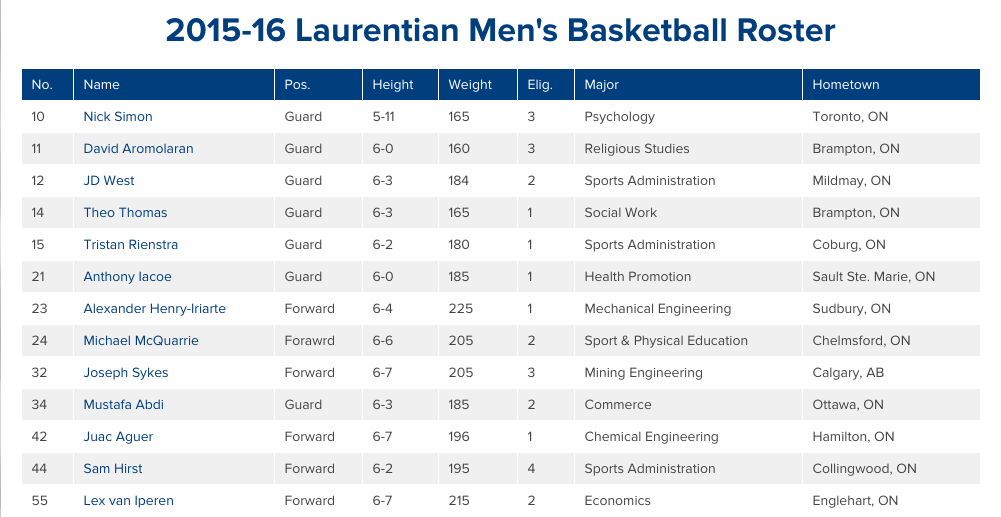By Jessica Robinson, Editor-in-Chief
Five veteran players on the Laurentian Voyageurs varsity men’s basketball team have been suspended by LU athletic director Peter Hellstrom over allegations of hazing at a rookie night ceremony held Sept. 24.
“As far as our university and their policy went, they didn’t really cover what they explained to us as hazing.” — Joe Sykes, suspended player
While the specific activities that took place at the rookie party have not yet been divulged as the investigative proceedings are ongoing, Joe Sykes, veteran player in his fourth year of eligibility confirmed that he was present at this year’s rookie night ceremony.
“At this very moment, I am under a suspension from the team,” Sykes said.
Sykes is suspended along with four other veterans: Anthony Iacoe, Theo Thomas, JD West, and David Aromolaran. At least three of these players were going to be on the starting line-up for the Voyageurs men’s basketball team this season.
Section 6A of the Laurentian University’s Student-Athlete Code of Conduct says that “Laurentian University has a zero tolerance policy on hazing, and the consequences can be severe.” The activities that fall under the umbrella of hazing are listed briefly, but the code clearly states that hazing is “by no means limited” to what is listed.
“When you think about hazing,” Sykes said, “if you’ve looked into hazing at other Canadian universities, stuff that’s made the news—usually that kind of stuff gets pretty bad.”
“When you think of absolutely unacceptable or way over the line, that’s what you think of: forced drinking, anything degrading, humiliating or dehumanizing,” Sykes said, “but as far as our university and their policy went, they didn’t really cover what they explained to us as hazing.”
“I went to McGill for two years [prior to coming to Laurentian],” Sykes said, “when I think of hazing, [I think of] the incident in 2005 with the men’s football team at McGill [that] involved them stripping their rookies naked, having them bound and gagged, and sexually assaulting them with a broom handle.”
Sykes said that Laurentian’s policy was brought to the athletes’ attention at the beginning of the year.
“They say zero tolerance for hazing,” Sykes said, “I understand the zero tolerance thing, but the biggest problem I see with that [is], they leave a very open interpretation of what may be considered hazing. They don’t explain specifically.”
“Although there is a list of things that may be considered hazing that was thrown into the student-athlete handbook, again, it’s a pretty general list.”
The code states in Section 6A 1.5.4 that teams traditionally hold a rookie night ceremony, and it is the players’ responsibility to inform the coach of the format of the team activities.
“The intent of such events is to have fun without causing any physical damage or creating any mental anguish to the participants,” the code says.
When the Lambda contacted Coach Shawn Swords, head coach of the men’s varsity basketball team, he only commented to advise that we discuss our questions with the athletic director.
Peter Hellstrom, the athletic director at Laurentian, explained that all student athletes are introduced to the Student Athlete Code of Conduct at a student orientation session at the beginning of the year.
“We have a whole package that every student athlete must sign once they’re brought onto our rosters here at LU,” Hellstrom said.
Traditionally, Hellstrom gives a speech at the start of the academic year welcoming everyone to Laurentian.
“Then, at the end of the day, they also have a set of forms to sign, and one of those is the Student Athlete Code of Conduct.”
By signing this code of conduct, student athletes are acknowledging that they have read and understood the contents, including the portions indicating what is allowed at rookie night ceremonies.
“I refer to the student athlete code of conduct, I ask them to familiarize themselves with it, I ask them to understand it, and they also sign off on a form that says they’ve done so,” Hellstrom said.
Rumblings about disciplinary action against the Voyageurs men’s basketball team began in the Canadian Interuniversity Sport community when the team pulled out of the Nipissing U Homecoming Tournament on September 29, the morning before they were expected to arrive in Nipissing.
With the whole team suspended as punishment for the rookie night activities, the Voyageurs were forced to withdraw from the tournament.
The team has since undergone a massive overhaul – it now includes five rookies that have never played CIS basketball, and two returning players that had intended to quit the team this year.
The initial suspensions were issued by Hellstrom. According to the Student-Athlete Code of Conduct, infractions of the code are dealt with on a case-by-case basis, to be reviewed by the athletic director, who then imposes sanctions, if any.
This may include a temporary suspension while the investigation is ongoing.
“This is uncharted waters.” — Peter Hellstrom, athletic director
Chris Mercer, the executive director of student life at Laurentian, has also become involved in these proceedings.
“There’s actually a couple of different processes that exist within the Student Athlete Code of Conduct,” Mercer said.
“The first one is within the purview of the athletic director, and that’s the one that frankly we’ve been through already. And then there’s another process that has a committee of inquiry, which is a process that any student athlete can avail themselves of should they so choose.”
“I think what you’re referring to here is students having chosen to go to the committee of inquiry,” Mercer said.
But according to the code, it is the athletic director himself who puts together the committee of inquiry.
The committee is to be made up of “minimum three members of the Laurentian campus community (faculty, staff, student athletes, alumni) who have not been directly involved in a case,” the code says.
The athletic director is also to act as chair of the committee.
“This is uncharted waters,” Hellstrom said when asked what his criteria will be for forming the Committee.
“It’s never been put together. The process is clear on who should be on it, but at the end of the day, it’s brand new,” he said.
“[The calling of this committee] is not common,” Mercer confirmed.
“I’ve been in this role two and a half years, and this is the first time this committee has been struck. But the nice part is that it is very clear in the Student-Athlete Code of Conduct how it works, what it does. And so students have always had that opportunity to go there; and now we get to.”
Neither Mercer nor Hellstrom have any experience in calling such a committee.
“To be honest with you,” Hellstrom said, “knock on wood, in my 21 years here, we’ve had very, very minimal breaches of our student-athlete code of conduct. Those that we’ve had, I can probably count on one hand, or less.”
“And when we’ve done those, we’ve acted in a timely manner, and come to a resolution in that process.”
After his initial interview, Hellstrom emailed the Lambda to clarify that “past breaches of the code, which as [he] said were minimal, were informal resolutions, and the committee [of inquiry] did not need to be struck.”
With infractions being dealt with on a case-by-case basis, it is at this point unclear what constitutes a minimal infraction, and what is considered severe enough to warrant suspension.
“Zero tolerance policies are blind to the realities of social life,” — Brenda Morrison, director of the Centre for Restorative Justice at Simon Fraser University
Despite decades of stories about hazing across Canadian university campuses, the term has yet to be clearly defined, leaving codes of conduct ambiguous, supported with sweeping generalizations about “values.”
In a follow-up interview in the Toronto Sun with D’Arcy McKeown in 2013, one of the McGill university rookies assaulted at a 2005 initiation explained that the hazing rituals took place at a “mandatory team dinner”.
In contrast, attendance was not mandatory at the Voyageurs’ basketball team’s rookie night, and not all rookies were present.
In 2012, the men’s varsity baseball team at Wilfrid Laurier University was suspended for four regular season games over rookie party hazing. According to a report in The Globe and Mail, there was alcohol involved, nobody was injured, and the police were not involved.
Laurier also has a zero tolerance policy when it comes to hazing, but Peter Baxter, Laurier’s athletic director, gave the team the opportunity to make a case for allowing them to resume play.
The Globe and Mail reported that the university said “the decision [to allow them to return to play] came after players apologized for the incident, volunteered to raise awareness and education about related issues and made a commitment to uphold the school’s student-athlete code of conduct.”
There have been other cases where “minor hazing rituals” result in indiscriminate suspensions.
Dalhousie University’s women’s hockey team lost their 17 veteran players to suspensions in 2011, forcing them to forfeit the season. While rookies who wanted to leave a rookie party early were escorted home, and others too drunk to leave were given clothes and a place to sleep for the night, as reported in the National Post, activities like eating hot peppers and optional drinking were deemed intolerable and deserving of disciplinary action.
Brenda Morrison, the director of the Centre for Restorative Justice at Simon Fraser University, said in that article that “zero tolerance policies are blind to the realities of social life, they are a one-size fits all model and they don’t build understanding, don’t necessarily deter others from participating in the same behaviour and they definitely don’t address the issues at the heart of the indiscretion.”
